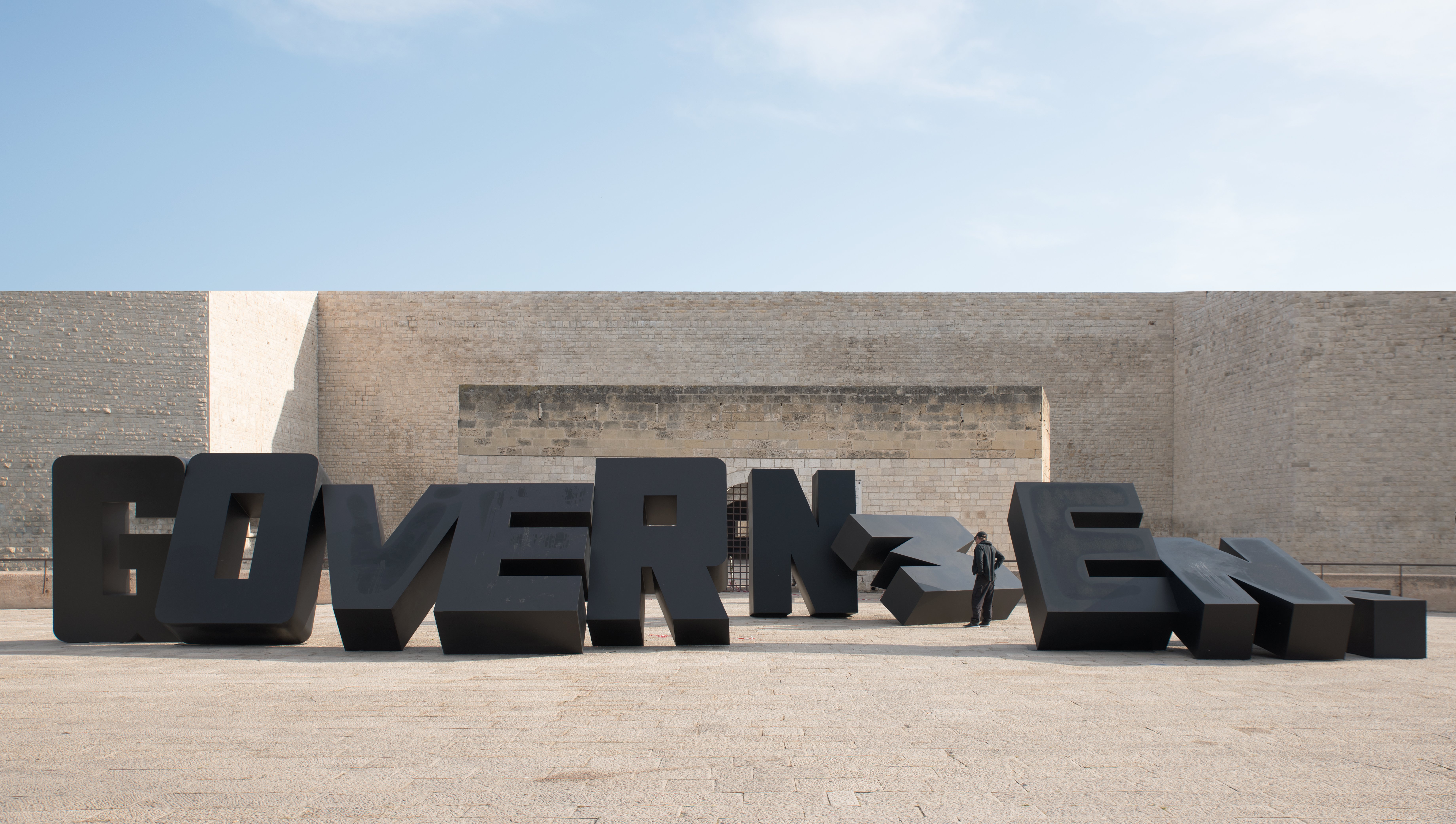
As Russian president Vladimir Putin tried to justify his war in Ukraine during his speech this morning for Victory Day, the dissident artist Andrei Molodkin is trying to make sure that the anniversary of Russia’s World War II victory is remembered differently.
Today, Molodkin, a former Soviet Union soldier turned conceptual artist, opened the doors to his secluded experimental art space in southwestern France to show politically charged art, and an alternative to Russia’s narrative about the war in Ukraine.
“This brutal war is a big catastrophe, a shock for everyone. It touches our family, and we understand that everything starts to change,” Molodkin told Artnet News. “But no one, no cultural institution can reflect on this. This is a political war, and artists who can communicate ideas the way Picasso made Guernica can change the world.”
Erik Bulatov, Everything’s Not So Scary (2016). Courtesy of the artist and the Foundry.
Molodkin’s Foundry, as it is called, is located in Maubourguet, on a 14,800-square-foot site that was originally an iron foundry opened in 1870 to produce armaments and military equipment. Molodkin discovered the abandoned site, which reminded him of an old Communist factory, over a decade ago and acquired it for €80,000 (then the equivalent of $69,600).
With the support of private donors, the Foundry has over the years been a production center for projects including Erik Bulatov’s Forward (2016), which is now in the collection of Tate, and Andres Serrano’s Torture (2015), a photography series that explores the history and violence of torture. Other artists who have worked at the Foundry include Russian artist Petr Davydtchenko, Madrid-based art collective Democracia, and dissident Russian artist Pyotr Pavlensky.
Now, Molodkin is using the space to showcase to the public art that’s been typically shut out of the mainstream system. Dissident artists, as well as scientists, musicians, and other creatives who are “not accepted by the power structure” are all welcome, he said.
To mark the occasion of the first public opening, Molodkin is teaming up with Laibach, an avant-garde group that was formed in the former Yugoslavian town of Trbovlje, for a performance titled Danger: We Forge the Future.
Democracia, Working Class (2017). Courtesy of the artists and the Foundry.
Molodkin was born in 1966 in the northern Russian town of Boui. He graduated with a degree in architecture and industrial design from the Stroganov Institute in Moscow in 1992. During his military service, in which he convoyed missiles across Siberia, Molodkin was put in prison to “correct” him from being distracted from his duties by art.
“In Russia, there’s this tradition where you aren’t considered a contemporary artist if you haven’t been in a prison,” said Molodkin, who is known for making art with blood and crude oil. “Many of my friends simply do not have the possibility to realize their projects because of the censorship they face,” he said. “It’s very difficult. They have to either move away from the country, go underground, or stay in prison.”
When he was featured in the Russian pavilion in the 2009 Venice Biennale, he was barred from talking to the press because his work, made with crude oil, was a direct critique of the Chechen war, which was estimated to have killed 60,000 people over the course of a decade.
Andrei Molodkin, Putin Filled with Ukrainian Blood (2022), projected at a church in central London. Courtesy of the artist.
Molodkin hopes that by opening the doors of the Foundry to the public anti-Putin voices will be heard at a time when Russians have been silenced both at home and abroad.
“When people cancel Russian culture, they are acting exactly the same as the totalitarian regime in the Soviet Union,” he said. “The cancel culture is the most dangerous, fascistic idea on our planet right now. It has become a great instrument for any power,” adding that it is important to separate a ruling regime from its people.
Molodkin’s own work on view is a “factual description” of Putin’s image, created with the blood of Ukrainians, the artist said. The work was previously shown in London to protest the invasion.
Some of the other works on display at the Foundry are by artists who say they face their own political problems at home. South African-born artist Kendall Geers called the Foundry “a parallel art world,” where it feels like “it’s still possible to experience true freedom of expression.”